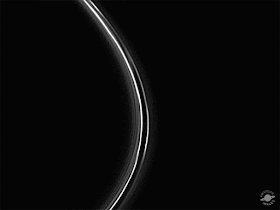NASA - Cassini International logo.
February 10, 2017
Saturn mission invites public to share artistic creations with #CassiniInspires.
Image above: Saturn Mosaic by Ian Regan. Image credits: NASA/JPL-Caltech/SSI/Ian Regan.
Although the motivation behind NASA's Cassini mission to Saturn was scientific, part of the planet's allure has long been in its undeniable physical beauty.
Animation above: Ring Motion by Sergio Maria-Fagundez. Animation credits: NASA/JPL-Caltech/SSI/Sergio Maria-Fagundez.
Since Cassini arrived at Saturn in 2004, dramatic views from the spacecraft's imaging cameras -- and other sensors that observe in infrared, ultraviolet and radio frequencies -- have revealed the ringed planet and its moons in unprecedented detail for scientists to study.
Cassini Inspires
Images taken by Cassini's cameras are published directly to the web shortly after they're received from the spacecraft, making them available for anyone to peruse and enjoy. And thus, throughout the journey, a dedicated community of space exploration enthusiasts has ridden along, sharing and discussing Cassini's images, often processing them to create their own spectacular scenes.
Image above: Saturn's Polar Storm by Roseann Arabia. Image credits: NASA/JPL-Caltech/Space Science Institute/Roseann Arabia.
"We're so gratified that Cassini's images have inspired people to work with the pictures themselves to produce such beautiful creations," said Linda Spilker, Cassini project scientist at NASA's Jet Propulsion Laboratory, Pasadena, California. "It's been truly wonderful for us to feel the love for Cassini from the public. The feeling from those of us on the mission is mutual.
Cassini Inspires
To celebrate the many ways Cassini's exploration of Saturn has sparked curiosity and wonder, the mission is launching a campaign planned to continue through the mission's dramatic conclusion in September.
Image above: Enceladus in the E Ring by Val Klavans. Image credits: NASA/JPL-Caltech/SSI/Val Klavans.
The activity, called "Cassini Inspires" invites members of the public to share their original Saturn-inspired artistic creations in a variety of different media (including painting, music, poetry, fiction, video or any format that can be shared online). To participate, artists post their creations on the social media platform of their choice, and tag them #CassiniInspires. For more information, visit:
https://saturn.jpl.nasa.gov/cassiniinspires
Launched in 1997, Cassini has been touring the Saturn system since arriving in 2004 for an up-close study of the planet, its rings and moons, and its vast magnetosphere. Cassini has made numerous dramatic discoveries, including a global ocean with indications of hydrothermal activity within the moon Enceladus, and liquid methane seas on another moon, Titan.
Image above: Half-phase Dione in Approximate True Color by Emily Lakdawalla. Image credits: NASA/JPL-Caltech/SSI/Emily Lakdawalla.
The mission is in its penultimate phase, performing weekly ring-grazing dives just past the outer edge of Saturn's main rings. In April, the spacecraft will begin its Grand Finale, plunging through the gap between the rings and the planet itself, leading up to a fateful plunge into Saturn on September 15.
Image above: Crescent Titan by Jason Major. Image credits: NASA/JPL-Caltech/SSI/Jason Major.
The Cassini-Huygens mission is a cooperative project of NASA, ESA (European Space Agency) and the Italian Space Agency. NASA's Jet Propulsion Laboratory, a division of Caltech in Pasadena, manages the mission for NASA's Science Mission Directorate, Washington. JPL designed, developed and assembled the Cassini orbiter.
More information about Cassini:
http://www.nasa.gov/cassini
http://saturn.jpl.nasa.gov
http://www.esa.int/Our_Activities/Space_Science/Cassini-Huygens
Images (mentioned), Animation (mentioned), Video, Text, Credits: NASA/JPL/Preston Dyches.
Best regards, Orbiter.ch







